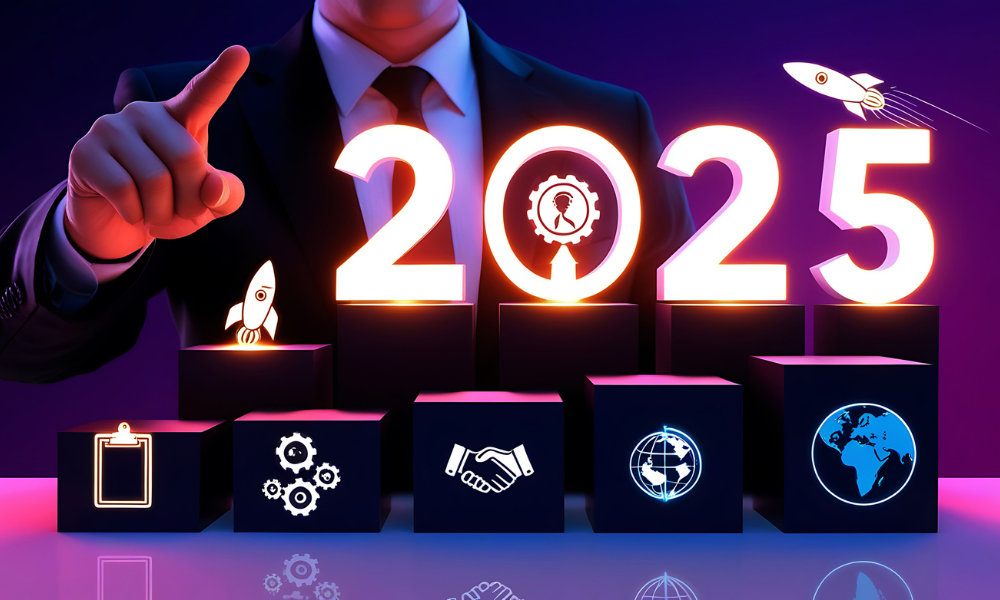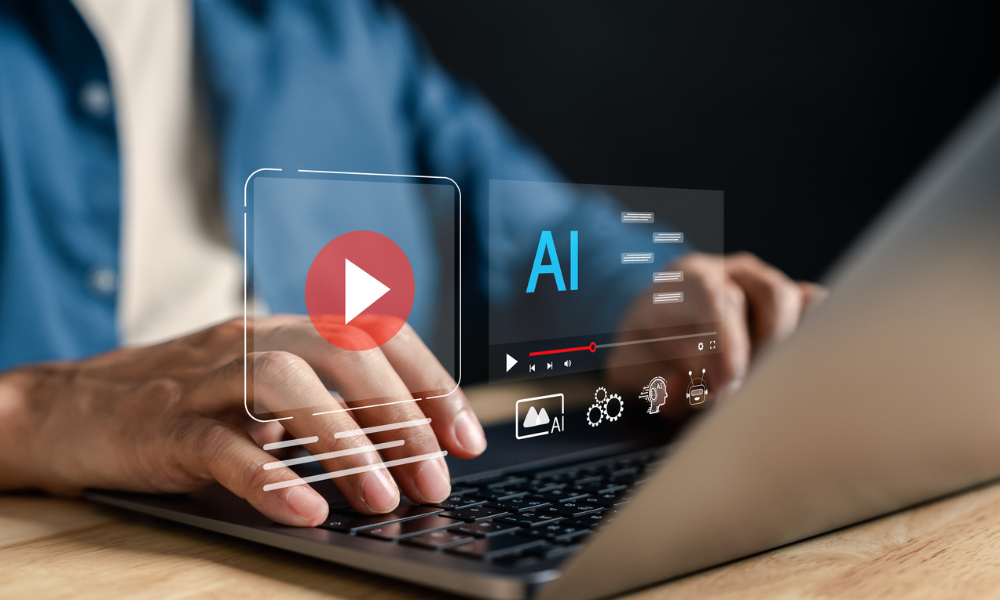The marketing world is constantly evolving, and 2025 promises to be a year full of exciting new trends that will revolutionize how brands connect with consumers. Whether you are a business owner, a marketing professional, or a content creator, staying ahead of the curve is essential for success. This year, from the rise of artificial intelligence (AI) in content creation and customer service to the growing importance of personalization and immersive experiences, we will see major shifts in how marketing strategies are designed and executed.
As we approach 2025, here are some key marketing trends that could transform the industry and give businesses a competitive edge in an ever-changing landscape.
1. AI-Powered Content Creation
AI is already significantly impacting marketing, and we expect this trend to accelerate dramatically in 2025. From automating content generation to improving the accuracy of targeted marketing campaigns, AI tools are becoming essential in the marketer’s toolbox.
One of the most exciting uses of AI in marketing is its ability to generate content at scale. AI-powered tools, such as natural language processing (NLP) models, can now write articles, blogs, social media posts, and even create video scripts in seconds. These tools use vast datasets and algorithms to replicate human language, making them incredibly efficient for content-heavy brands.
For example, businesses can now use AI to write SEO-optimized blog posts, produce social media captions, and create personalized email newsletters with minimal effort. These advancements reduce the time needed to produce high-quality content and improve consistency and relevance for specific target audiences. Expect to see more companies adopting AI for content creation in 2025 to maintain a steady stream of engaging content that resonates with consumers.
2. AI in Customer Service: Chatbots and Virtual Assistants
Artificial intelligence also waves in customer service, with chatbots and virtual assistants becoming increasingly sophisticated. In 2025, we can expect more businesses to adopt AI-driven customer service tools to streamline interactions and enhance customer experiences.
Today’s AI-powered chatbots can handle a wide range of tasks, from answering frequently asked questions to troubleshooting problems and processing transactions. As these systems become more intelligent, they will offer even more personalized and efficient customer support, improving response times and satisfaction levels.
In addition, AI virtual assistants are becoming more integrated into the customer experience, guiding users through the buying journey, offering product recommendations, and even responding to inquiries in real time. These innovations allow businesses to provide 24/7 customer support without needing a large customer service team. By using AI for customer service in 2025, companies can create smoother, more efficient interactions that drive customer loyalty and reduce operational costs.
3. Personalization at Scale
One of the biggest challenges marketers face is creating personalized experiences at scale. In 2025, this challenge will be addressed more effectively thanks to advancements in AI and machine learning (ML). AI enables marketers to analyze vast amounts of customer data, segment audiences more accurately, and tailor content, offers, and advertisements to each individual’s preferences.
Consumers now expect personalized experiences when interacting with brands. Whether they receive a customized email newsletter, see relevant product recommendations on an e-commerce site, or experience targeted ads on social media, personalization is key to building lasting customer relationships. In fact, according to a study by Epsilon, 80% of consumers are more likely to make a purchase when brands offer personalized experiences.
In 2025, expect businesses to leverage AI-driven personalization to create highly tailored customer journeys. AI will immediately analyze past behaviors, preferences, browsing habits, and even demographic data to deliver highly relevant messaging immediately. By automating this process, companies can create more dynamic, individualized marketing strategies that resonate with customers and drive conversions.
4. Voice Search Optimization and AI-Driven Voice Assistants
The use of voice search continues to rise, and by 2025, voice-based interactions will play an even more significant role in marketing. With the widespread adoption of virtual assistants like Siri, Alexa, and Google Assistant, marketers must adapt their strategies to accommodate voice search queries.
Voice search optimization involves tailoring content and SEO strategies to align with the way people speak rather than type. For example, voice searches are longer and more conversational than text-based searches, so marketers must optimize content for these queries. This means targeting long-tail keywords, using more natural language in website content, and ensuring that your business is easily discoverable through voice search.
Additionally, AI-driven voice assistants will become an even more integral part of consumer brand interactions. In 2025, brands will increasingly use voice assistants not just for customer service but as a tool for deeper engagement. For instance, a voice assistant might recommend products based on previous purchases, help customers navigate a website, or even complete transactions hands-free. Marketers will need to integrate voice technologies into their digital strategies to stay relevant in this increasingly voice-driven world.
5. Video Marketing: Interactive and Shoppable Content
Video marketing has been a dominant trend in recent years, and in 2025, it will continue to evolve. With the rise of social media platforms like TikTok, Instagram Reels, and YouTube Shorts, short-form video content has become essential for brand engagement. However, it’s not just about creating engaging videos; marketers are now incorporating interactivity and e-commerce features into video content to enhance the user experience and drive sales.
Shoppable video content allows consumers to purchase directly through videos, eliminating the need to leave the platform to buy a product. This trend is expected to grow significantly in 2025, as platforms like Instagram and YouTube continue to refine their e-commerce capabilities. Marketers must create videos that entertain and drive immediate action, whether purchasing a product, signing up for a service, or simply engaging with the brand.
Interactive videos, where viewers can choose their path or interact with on-screen elements, are also gaining traction. These types of videos offer a more engaging experience, allowing consumers to interact with the content in a more personalized way. By offering these interactive elements, brands can create memorable experiences that keep customers returning.
6. Augmented Reality (AR) and Virtual Reality (VR) Marketing
As technology advances, brands increasingly look to immersive experiences like augmented reality (AR) and virtual reality (VR) to engage consumers in new ways. In 2025, these technologies will be crucial in creating unique marketing experiences that captivate and inspire customers.
AR and VR allow businesses to bring their products and services to life in once unimaginable ways. For example, brands in the retail industry are already using AR to allow customers to “try on” products virtually before making a purchase. This is particularly popular in the fashion and beauty industries, where customers can see how a piece of clothing or makeup will look on them without having to visit a physical store.
In 2025, expect even more brands to adopt AR and VR technologies, especially in sectors like real estate, automotive, and tourism. Imagine taking a virtual home tour, test-driving a car from your living room, or visiting a vacation destination without leaving your house. These immersive experiences will create new business opportunities to engage with consumers, drive sales, and foster loyalty.
7. Larger Budgets for Video Production and Editing
As video marketing continues to dominate, businesses will allocate larger portions of their marketing budgets to video production and editing in 2025. Video is not only more engaging but also more effective at conveying a message in a shorter amount of time. Studies show that video content can increase engagement and conversions by up to 80%, making it a critical brand investment.
Expect businesses to increase their spending on high-quality video content, from professionally produced commercials to social media videos and tutorials. Enhanced video production tools and platforms, such as 360-degree video and animation, will provide more creative opportunities for brands to engage their audiences in innovative ways.
With the growing demand for video content, many companies will also invest in better video editing software and hire skilled professionals to create polished, on-brand video campaigns. As a result, video will continue to be a central pillar of many brands’ digital marketing strategies in 2025.
8. Increased Spending on Facebook and Google Ads
Digital advertising is evolving, and by 2025, businesses will significantly increase their marketing budgets for platforms like Facebook and Google. Despite the rise of new social media platforms, Facebook and Google dominate digital advertising, and this trend will only grow in the coming years. Businesses are seeing high returns on ad spending through targeted ads on these platforms, which offer unparalleled reach and precise targeting capabilities.
In particular, Facebook’s ability to hyper-target audiences based on behaviors, interests, and demographics makes it an attractive platform for advertisers looking to connect with specific consumer segments. With its dominance in search and display advertising, Google Ads allows businesses to target potential customers when they are actively searching for products or services.
In 2025, businesses should allocate more advertising budgets to these platforms to reach customers more precisely and efficiently.
9. Sustainability Marketing
As sustainability becomes an increasingly important for consumers, marketing efforts must reflect this growing demand for eco-friendly products and practices. In 2025, expect brands to focus more on sustainability marketing—showcasing their commitment to environmentally friendly practices, sustainable sourcing, and social responsibility.
Consumers are more likely to support brands that align with their values, particularly regarding environmental issues. In fact, according to a report from Nielsen, 66% of global consumers are willing to pay more for sustainable brands. As a result, businesses will be expected to promote their eco-friendly initiatives and incorporate sustainability into every aspect of their marketing strategies—from product development and packaging to advertising and messaging.
10. Website Management and SEO: The Evolving Role of Search Engine Optimization
In 2025, managing your website effectively and optimizing it for search engines will continue to be a cornerstone of any successful digital marketing strategy. As search engines like Google evolve to prioritize user experience, website management and SEO practices are becoming more complex and integrated than ever before.
Websites must be faster, mobile-responsive, and user-friendly to rank well in search results. Google’s Core Web Vitals update, which measures a page’s loading speed, interactivity, and visual stability, will remain a significant factor in ranking algorithms. In addition, voice search optimization will continue to impact SEO strategies, requiring businesses to adjust their content to accommodate conversational queries.
Beyond the technical aspects, SEO will focus more on the quality and relevance of content. Businesses must ensure that their content is helpful, informative, and well-structured to meet the needs of users and search engines alike. Marketers must also embrace more sophisticated SEO tools integrating AI and machine learning to identify high-value keywords and optimize content more effectively.
Moreover, businesses should expect to invest more in website management tools that offer seamless integration with various marketing platforms. From email marketing and social media to analytics and customer relationship management (CRM) systems, businesses will rely on these platforms to create an efficient marketing ecosystem that drives results.
Navigating the Future of Marketing
As we move into 2025, the future of marketing will be driven by technological advancements and a shift toward more personalized, immersive experiences. AI, voice search optimization, personalized content, immersive AR/VR marketing, and increased investment in video production will become central to how brands engage with consumers. Video production budgets and spending on Facebook and Google Ads will also increase as businesses look to stay competitive in the ever-expanding digital landscape.
The key to success will lie in embracing these innovations while staying true to your brand’s core values and creating meaningful, lasting connections with your audience. By staying ahead of the trends and adapting to the changing landscape, marketers can continue to deliver exceptional experiences that resonate with today’s empowered consumers. The future of marketing is bright, and 2025 promises to be an exciting year full of possibilities for brands ready to innovate.






